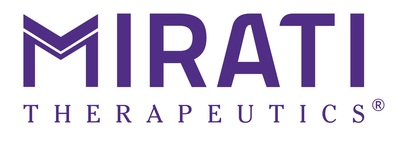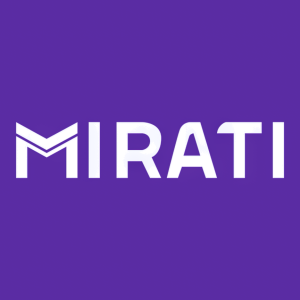Mirati Therapeutics Presents Late-Breaking Results Evaluating Concurrent Adagrasib and Pembrolizumab in First-Line Advanced/Metastatic Non-Small Cell Lung Cancer (NSCLC)
Mirati Therapeutics (MRTX) announced promising preliminary results from the KRYSTAL-7 Phase 2 trial and KRYSTAL-1 Phase 1b cohort, evaluating adagrasib combined with pembrolizumab for first-line treatment of advanced NSCLC with a KRASG12C mutation. The trials demonstrated favorable tolerability, with treatment-related adverse events primarily Grade 1-2. Notably, the objective response rate reached 49%, with some cohorts showing even higher rates. The findings will be presented at the ESMO Congress on December 7, 2022, highlighting the potential of this combination as a chemotherapy-free option.
- Objective response rate (ORR) of 49% in evaluable patients.
- Encouraging preliminary efficacy in first-line NSCLC with KRASG12C mutation.
- No Grade 5 treatment-related adverse events reported.
- Potential for chemotherapy-free treatment option.
- 40% of patients experienced Grade 3 treatment-related adverse events.
Insights
Analyzing...
- Adagrasib in combination with pembrolizumab demonstrates favorable tolerability and promising preliminary efficacy in patients with first-line advanced/metastatic NSCLC harboring a KRASG12C mutation
- Findings will be presented on December 7 at the 2022 ESMO Immuno-Oncology Annual Congress, as an oral presentation from 2:05 p.m.-2:15 p.m. CET / 8:05 a.m.-8:15 a.m. ET (Presentation #LBA4) during the "Proffered Paper session 1" session.
SAN DIEGO, Dec. 5, 2022 /PRNewswire/ -- Mirati Therapeutics, Inc. (NASDAQ: MRTX), a clinical-stage oncology company today announced preliminary results from the KRYSTAL-7 Phase 2 trial and KRYSTAL-1 Phase 1b cohort evaluating adagrasib (400mg twice daily) concurrently combined with pembrolizumab in patients for the treatment of first-line NSCLC harboring a KRASG12C mutation across all PD-L1 subgroups. These data are the first to demonstrate the tolerability and feasibility of a concurrent combination regimen of a KRASG12C inhibitor and a PD-1/L1 checkpoint inhibitor.
Summary of Clinical Results
- The KRYSTAL-7 and KRYSTAL-1 trials represent the largest dataset evaluating a KRASG12C inhibitor in combination with a PD-1/L1 checkpoint inhibitor as a first-line treatment for patients with NSCLC harboring a KRASG12C mutation.
- 75 patients were enrolled and evaluable for safety with a median follow-up of 3.5 months (duration of treatment: 2 months). Treatment-related adverse events (TRAEs) were Grade 1-2 (
39% ), Grade 3 (40% ) and Grade 4 (4% ); there were no Grade 5 TRAEs observed. TRAEs led to discontinuation of both adagrasib and pembrolizumab in 2 patients and only pembrolizumab in 2 patients; there were no patients who discontinued only adagrasib due to a TRAE. - Increases in alanine transaminase (ALT)/ aspartate transaminase (AST) were consistent with either agent as a monotherapy with Grade 3 TRAEs being highest grade and total incidence of Grade 3 liver function test (LFT) increases of
9% . Median time from onset to an increase in ALT and AST was 26 and 37 days, respectively and only 1 patient experienced new onset treatment-related ALT/AST increase after 3 months. - Of patients who were clinically evaluable and received at least one on-study scan (n=53), adagrasib and pembrolizumab demonstrated promising preliminary clinical activity across all PD-L1 subgroups with an objective response rate (ORR) of
49% . - In a subset of response-evaluable patients enrolled at least 6 months prior to the data cutoff date, 6 of 26 clinical responses occurred at second on-study scan or later, and the ORR was
56% . - 7 evaluable patients enrolled in the KRYSTAL-1 Phase 1b cohort (with a median follow-up of 19.3 months) reported an ORR of
57% and a disease control rate (DCR) of100% . The four patients who responded maintained response for over nine months while two continued to receive treatment and remain in response beyond 18 months. - Safety in the KRYSTAL-1 Phase 1b cohort was consistent with what has been observed in KRSTYAL-7 and demonstrated a manageable safety profile with no Grade 4-5 TRAEs.
"Initial results across all cohorts suggest the concurrent combination of adagrasib and pembrolizumab may provide a chemotherapy-free option for treatment-naïve NSCLC with a manageable safety profile and encouraging clinical activity," said Pasi A. Jänne, MD, PhD, Dana Farber Cancer Institute. "Across all evaluated cohorts, liver-related TRAEs were predominantly low grade and occurred early in treatment, with limited new onset after 3 months."
"We look forward to progressing our clinical development in the first line setting with a goal of providing better options for patients with NSCLC harboring a KRASG12C mutation," said Chuck Baum, president, founder, and head of research and development, Mirati Therapeutics, Inc. "This data further underscores the potential of adagrasib as a well-tolerated treatment option for patients. Based on these data, we look forward to initiating a Phase 3 trial."
The data (Presentation #LBA4) will be presented in an oral presentation on Dec. 7 at 2:05 p.m.-2:15 p.m. CET / 8:05 a.m.-8:15 a.m. ET during the Proffered Paper session 1 at the European Society for Medical Oncology Immuno-Oncology (ESMO IO) Congress 2022.
Mirati Therapeutics will host an Investor Event on Wednesday, December 7, 2022, at 5:00 p.m. CET / 11:00 a.m. ET.
Company executives will provide an overview of the adagrasib and pembrolizumab combination data presented 2022 ESMO Immuno-Oncology Annual Congress.
Investors and the general public are invited to register and listen to a live webcast of the event through the "Investors and Media" section on Mirati.com. A replay of the event will be available shortly after the conclusion of the event.
Adagrasib is an investigational, highly selective, and potent oral small-molecule inhibitor of KRASG12C that is optimized to sustain target inhibition, an attribute that could be important to treat KRASG12C-mutated cancers, as the KRASG12C protein regenerates every 24-48 hours. Studies of adagrasib have shown that the drug has a long half-life and extensive tissue distribution, and is well tolerated. In clinical trials, adagrasib also has shown, central nervous system penetrance and single-agent responses in non-small cell lung cancer (NSCLC), colorectal cancer, pancreatic cancer and other solid tumors with KRASG12C mutations. Adagrasib is being evaluated in several clinical trials in combination with other anti-cancer therapies in patients with advanced solid tumors. Registration-enabling studies are ongoing in NSCLC and colorectal cancer. For more information visit Mirati.com/science.
Mirati Therapeutics, Inc. is a biotechnology company whose mission is to discover, design and deliver breakthrough therapies to transform the lives of patients with cancer and their loved ones. The company is relentlessly focused on bringing forward therapies that address areas of high unmet need, including lung cancer, and advancing a pipeline of novel therapeutics targeting the genetic and immunological drivers of cancer. Unified for patients, Mirati's vision is to unlock the science behind the promise of a life beyond cancer.
For more information about Mirati, visit us at Mirati.com or follow us on Twitter, LinkedIn and Facebook.
This press release contains forward-looking statements regarding the business of Mirati Therapeutics, Inc. ("Mirati"). Any statement describing Mirati's goals, expectations, financial or other projections, intentions or beliefs, development plans and the commercial potential of Mirati's drug development pipeline, including without limitation adagrasib (selective KRASG12C inhibitor), sitravatinib (TAM receptor inhibitor), MRTX1719 (MTA-cooperative PRMT5 inhibitor), MRTX0902 (SOS1 inhibitor), and MRTX1133 (selective KRASG12D inhibitor), is a forward-looking statement and should be considered an at-risk statement. Such statements are subject to risks and uncertainties, particularly those challenges inherent in the process of discovering, developing and commercialization of new drug products that are safe and effective for use as human therapeutics, and in the endeavor of building a business around such drugs.
Mirati's forward-looking statements also involve assumptions that, if they never materialize or prove correct, could cause its results to differ materially from those expressed or implied by such forward-looking statements. Although Mirati's forward-looking statements reflect the good faith judgment of its management, these statements are based only on facts and factors currently known by Mirati. As a result, you are cautioned not to rely on these forward-looking statements. These and other risks concerning Mirati's programs are described in additional detail in Mirati's quarterly reports on Form 10-Q and annual reports on Form 10-K, which are on file with the U.S. Securities and Exchange Commission (the "SEC") available at the SEC's Internet site (www.sec.gov). These forward-looking statements are made as of the date of this press release, and Mirati assumes no obligation to update the forward-looking statements, or to update the reasons why actual results could differ from those projected in the forward-looking statements, except as required by law.
Mirati Contacts
Investor Relations: ir@mirati.com
Media Relations: media@mirati.com
References
1 Hallin J, Engstrom LD, Hargis L, et al. The KRASG12C Inhibitor MRTX849 Provides Insight toward Therapeutic Susceptibility of KRAS-Mutant Cancers in Mouse Models and Patients. Cancer Discov. 2020;10(1):54-71.
![]() View original content to download multimedia:https://www.prnewswire.com/news-releases/mirati-therapeutics-presents-late-breaking-results-evaluating-concurrent-adagrasib-and-pembrolizumab-in-first-line-advancedmetastatic-non-small-cell-lung-cancer-nsclc-301695132.html
View original content to download multimedia:https://www.prnewswire.com/news-releases/mirati-therapeutics-presents-late-breaking-results-evaluating-concurrent-adagrasib-and-pembrolizumab-in-first-line-advancedmetastatic-non-small-cell-lung-cancer-nsclc-301695132.html
SOURCE Mirati Therapeutics, Inc.








